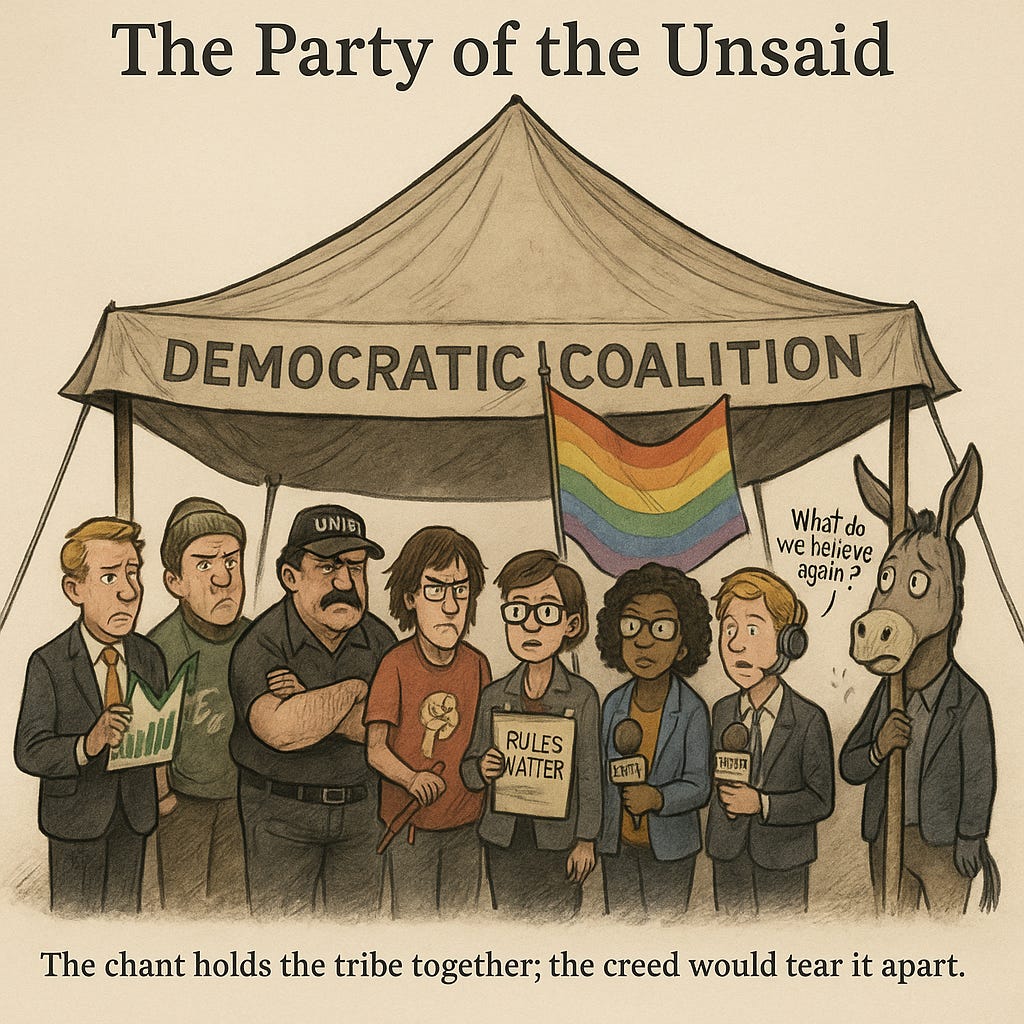The Party of the Unsaid
They tell us what they hate but not what they stand for
The Party of the Unsaid
By Jim Reynolds | www.reynolds.com
I read an essay this week trying to explain the difference between centrist and populist Democrats.
By the end, I wasn’t enlightened — I was lost.
Here we were, parsing supposed factions that have never clearly said what they stand for. How do you chart the distance between two camps when neither has a map? How do you measure ideological space when no one will declare what they’re for?
That’s the problem at the heart of the modern Democratic Party. It isn’t that they disagree on policy. It’s that they refuse to define one.
A Party Afraid of Its Own Reflection
Democrats today speak only in the negative.
They’re anti-Trump, anti-MAGA, anti-gun violence, anti-racism, anti-disinformation, anti-“threats to democracy”, and, it would appear, anti-America.
They can tell you what they hate, but not what they believe.
It’s the language of opposition, not conviction — a vocabulary built entirely from reaction.
And the reason runs deeper than messaging. It’s survival.
The modern Democratic coalition is a loose confederation of cultural and economic tribes — environmentalists, unionists, Wall Street donors, academics, bureaucrats, social activists, tech elites, and a wide constellation of ethnic and identity blocs, each with its own hierarchy of grievance and demand.
State what you stand for, and you risk alienating one of them.
Say something for the worker, you offend the climate crowd.
Say something for the border, you lose the activists.
Say something for the middle class, you lose the donors.
So the leadership speaks in code and contradiction — every sentence sanded down for internal survival.
The chant holds the tribe together; the creed would tear it apart.
The Fear of Saying Anything True
The Democrats’ problem isn’t message control — it’s message terror.
Every honest position comes with an internal firing squad.
Say you support fairness in girls’ sports, and you’re branded anti-trans.
Say you support the police, and you’re called racist.
Say you want better education, and you’re anti–teachers’ union.
Say you support Israel, and you’re a fascist Zionist.
Say you oppose frivolous environmental laws, and you’re anti-planet.
Praise Trump — even briefly — for a Middle East success, and you’re excommunicated from the party.
Each statement is moral quicksand.
You can’t plant a flag without triggering the alarm system in your own tent.
So the safest course is to say nothing real — just repeat the slogans and hate the right people.
The modern Left doesn’t debate ideas; it polices them.
The Post-Policy Left
In the 20th century, Democrats were the party of work.
In the 21st, they’ve become the party of warning labels.
When governing gets hard, they change the subject. When voters ask for results, they offer moral alarm.
Symbolic victories — DEI, climate virtue, hashtags — substitute for measurable progress. The performance is the policy.
They still claim to “defend democracy,” but that phrase now functions as a mirror — reflecting only the fear of losing power, not any concrete idea of what power should do.
Ask them for a vision and they’ll give you a villain.
Ask them for a policy and they’ll give you a panic.
The Contrast
Conservative America doesn’t have that problem.
They can say what they’re for without a focus group:
Secure borders
Strong families
Free speech
Lower taxes
Rule of law
Equal opportunity for all
Smaller government
Personal accountability
Merit-based hiring and admission policies
Free enterprise
You may not agree with all of it, but at least you know it.
Their clarity reads as confidence. The Democrats’ caution reads as deceit.
That’s why “Make America Great Again” still works.
It’s an action statement, not a posture. It gives voters something to attach to.
The Real Divide
The real divide in America isn’t between left and right anymore — it’s between those who can speak plainly about their beliefs and those who can’t.
The Right may fight internally over tactics, but they know their core.
The Left can’t even name theirs.
They agree only on what they oppose.
That’s not ideology. That’s inertia.
Bob’s Note
“If you can’t say what you’re for, you’re not a movement — you’re a mob waiting for orders.”
And that, more than any polling or messaging glitch, is the Democrats’ central defect.
They’ve traded conviction for calibration — and in doing so, lost both the country’s trust and their own reflection.
Grook: The Party of the Unsaid
They chant what they hate,
not what they believe.
Their comfort is noise,
their terror — to grieve.
The tent holds together
by silence and spin;
the truth would divide them,
so none may begin.



